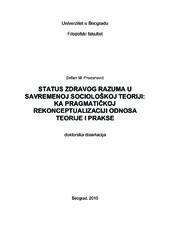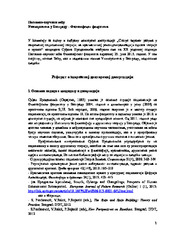Приказ основних података о дисертацији
Status zdravog razuma u savremenoj sociološkoj teoriji
The status of common sense in contemporary social theory: toward a pragmatic reconceptualization of the relationship between theory and practice
| dc.contributor.advisor | Spasić, Ivana | |
| dc.contributor.other | Spasić, Ivana | |
| dc.contributor.other | Molnar, Aleksandar | |
| dc.contributor.other | Pavićević, Đorđe | |
| dc.creator | Prodanović, Srđan M. | |
| dc.date.accessioned | 2020-07-03T10:03:40Z | |
| dc.date.available | 2020-07-03T10:03:40Z | |
| dc.date.issued | 2015-10-19 | |
| dc.identifier.uri | https://nardus.mpn.gov.rs/handle/123456789/4549 | |
| dc.identifier.uri | http://eteze.bg.ac.rs/application/showtheses?thesesId=2411 | |
| dc.identifier.uri | https://fedorabg.bg.ac.rs/fedora/get/o:10416/bdef:Content/download | |
| dc.identifier.uri | http://vbs.rs/scripts/cobiss?command=DISPLAY&base=70036&RID=526271895 | |
| dc.description.abstract | Predmet istraživanja ovog rada biće istorijski prikaz i kritička analiza teorijskih sličnosti i razlika između pragmatizma i sociologije. U središtu našeg interesovanja će biti teorijski uvidi u zdravorazumsko mišljenje koji su prisutni u savremenoj sociologiji i pragmatizmu. Pažnju ćemo pre svega posvetiti autorima interpretativne sociologije i savremenim teoretičarima prakse. U radu ćemo ispitati kakvu ulogu je pragmatičko shvatanje zdravog razuma igralo pri formulaciji teorijskih uvida o svakodnevnom iskustvu koji se nude u interpretativnoj sociologiji i novim teorijama prakse. Pored toga, razmotrićemo značaj ovih istorijskih preklapanja izmenu pragmatizma i sociologije za potencijalnu rekonceptualizaciju međusobnog odnosa teorijskog znanja i svakodnevne prakse. Metod koji ćemo koristiti će pre svega podrazumevati istraživačke postupke s kojima se srećemo u studijama koje se bave međusobnim uticajem teorijskih ideja kao što su: poređenje ideja, teza i teorijskih polazišta; ispitivanje evolucije teorijskih stanovišta; ispitivanje kontekstualnih uslova nastanka i razvoja teorijskih ideja. Ova poređenja ćemo vršiti sa namerom da pokažemo da je konceptualizacija zdravorazumskog mišljenja igrala važnu ulogu pri stvaranju novih pristupa i pravaca u savremenoj sociologiji. Metod će takođe biti analitički kada su u pitanju procene logičke koherentnosti teorijskih određenja zdravog razuma u delima autora koji će biti u fokusu istraživanja. Cilj rada je da pokaže da pragmatičko poimanje zdravog razuma može da posluži kao teorijski okvir za povezivanje društvene teorije i svakodnevne prakse. Nastojaćemo da dokažemo da kontinuitet između zdravorazumskog načina mišljenja i sociološke teorije koji ne podrazumeva podrivanje kritičkog potencijala same društvene teorije. U uvodnom delu rada u kome ćemo se ukratko osvrnuti na radove klasičnih pragmatista i sociologa, Džona Djuija i Emila Dirkema. Videćemo da je između dvojice autora postojalo teorijsko saglasje po pitanju razumevanja osnova fenomena društvenosti, te da su se razlike uglavnom bazirale na različitim epistemološkom uvidima. Naime, naturalizam koji je svojstven Djuievom pragmatizmu je u određenoj meri podrazumevao kontinuitet između zdravorazumskog i naučnog mišljenja, a ovakvo gledište je pak bilo u suprotnosti sa Direkemovom verzijom pozitivizma u kome 5 svakodnevno, zdravorazumsko znanje nikada ne može samerljivo sa naučnom istinom. Tvrdićemo da je ova razlika temeljno pratila dalji razvoj odnosa sociologije i pragmatizma. Međutim, značaj Dirkemovih epistemoloških gledišta se svakako najviše ogledao u činjenici da su upravo ovi uvidi odigrali jednu od ključnih uloga u formiranju funkcionalizma, kao jednog od najuticajnih teorijskih struja u savremenoj sociologiji. U prvom poglavlju ćemo tako nastojati da objasnimo na koji način su fenomenologija i pragmatizam stvorile osnovu za prevazilaženje ove paradigme. Naročito pažnju ćemo posvetiti radovima Alfreda Šica i Džordža Herberta Mida koji su značajno uticale na interpretativnu sociologiju. U drugom poglavlju ćemo kritički razmotriti teorijske uvide dvojice prominentnih interpretativnih sociologa, Harolda Garfinkela i Ervinga Gofmana. Usredsredićemo se na njihovo tvrdnju da nesvodivosti konkretnog zdravorazumskog znanja na opšte obrasce razumevanja društvene stvarnosti, kao i na ustaljeni prigovor da se u okvirima njihovih sociologija ne mogu osvetliti odnosi moći u društvu. U trećem poglavlju analiziraćemo radove Pjera Burdijea i Lika Boltanskog koji su u okviru pravca novih teorija prakse upravo pokušali da formulišu sintezu partikularnog zdravorazumskog znanja i univerzalnog jezika teorijske kritike. U četvrtom poglavlju promatraćemo u kojoj meri nam uvidi neopragmatista Ričarda Rortija i Donalda Dejvidsona omogućavaju da prevaziđemo određene manjkavati novih teorija prakse. U zaključnom delu rada tvrdićemo da nam naša analiza sugeriše nužnost uviđanja strukture zdravog razuma. Shodno tome, obrazložićemo distinkciju između svojstava konkretnog, svakodnevnog znanja zdravog razuma i zdravorazumskih kvazi teorija. Pokazaćemo da se prva vrsta znanja ne može univerzalizovati i sledi uvide koje su formulisali Garfinkel i Gofman, dok druga vrsta znanja često reprodukuje odnose moći i nejednakosti i zahteva teorijsku kritiku. | sr |
| dc.description.abstract | The object of the research conducted in this thesis will be an historical review and critical analysis of theoretical similarities and differences between pragmatism and sociology. The focus of my interest will be on the theoretical insights into common sense that can be found in contemporary sociology and pragmatism. I will mainly dedicate my attention to the authors of interpretive sociology and new theories of practice. In the thesis I will investigate the role that the pragmatic view on common sense had on the formulation of theoretical insights into everyday experience offered by the interpretive sociology and new theories of practice. Aside from this, I will also reflect on the importance that the theoretical overlapping between pragmatism and sociology had for the potential reconceptualization of the relation between theoretical knowledge and everyday practice. The method that I am going to rely on generally entails research procedures that can be found in studies that deal with mutual influence of theoretical ideas such as: comparison of ideas and theoretical standpoints; investigation of evolution of theoretical insights; investigation of contextual factors that influence the emergence and development of theoretical ideas. The goal of these comparisons that I will be making is to prove that conceptualization of common sense played an important role in creation of new approaches and paradigms in contemporary sociology. The method will also be analytical in the sense that I will systematically question logical coherence of theoretical designations of common sense in the works of authors that will be in the focus of this work. The goal of this thesis is to show that pragmatic understating of common sense could serve as a theoretical frame in which social theory and everyday practice might become closer. I will try to prove that there is continuity between common sense and sociological theory which does not imply that the critical potential of the social theory becomes undermined by this fact. In the introductory part of the thesis, we will shorty review the works of two classical pragmatists and sociologist, John Dewey and Emile Durkheim. We will see that there was a theoretical accordance between the two authors regarding the basis of the phenomena of sociability, and that the differences were mainly grounded on epistemological insights. Namely, Dewey’s naturalism largely entailed a certain amount 7 of continuity between commonsense and scientific ways of thinking and this view was in opposition with Durkheim’s positivism, which implied that everyday knowledge of common sense can ever be commensurable with scientific truth. I will maintain that this difference thoroughly followed further development of both sociology and pragmatism. However, the importance of Durkheim’s epistemological insights can primarily be found in the fact that they played a crucial role in the appearance of functionalism, as one of the most influential theoretical currents in modern sociology. Therefore, in the first chapter I will try to explain how phenomenology and pragmatism laid the foundation for the overcoming of this paradigm. I will especially focus my attention to the works of Alfred Schutz and George Herbert Mead that profoundly influenced interpretative sociology. In the second chapter, I will critically reflect on the theoretical insights of two prominent interpretative sociologists, Harold Garfinkel and Erving Goffman. We will center our analysis on their claim that the concrete everyday knowledge can never be reduced to general forms of understanding social reality, as well as on the typical objection to their work according to which this kind of sociology cannot shed light on power relations present in the society. In the third chapter we will analyze the works of Pierre Bourdieu and Luc Boltanski in which they tried to formulate a synthesis of particular common sense knowledge and universal language of social critique. In the fourth chapter we will consider to which extent the views of the neopragmatists, Richard Rorty and Donald Davidson can help us to overcome some of the shortcomings of the new theories of practice. In the concluding part of the thesis I will claim that our examination suggests that we must take into account the structure of common sense. Therefore, we I will explain the distinction between the properties of concrete everyday knowledge of common sense and commonsensical quasi theories. I will show that the first kind of knowledge cannot be universalized and that it follows the insights Garfinkel and Goffman, while the second kind of knowledge often reproduces the power relations and inequality and demands a theoretical critique. | en |
| dc.format | application/pdf | |
| dc.language | sr | |
| dc.publisher | Универзитет у Београду, Филозофски факултет | sr |
| dc.relation | info:eu-repo/grantAgreement/MESTD/Integrated and Interdisciplinary Research (IIR or III)/43007/RS// | |
| dc.rights | openAccess | en |
| dc.rights.uri | https://creativecommons.org/licenses/by-nc/4.0/ | |
| dc.source | Универзитет у Београду | sr |
| dc.subject | pragmatizam | sr |
| dc.subject | pragmatism | en |
| dc.subject | interpretativna sociologija | sr |
| dc.subject | fenomenologija | sr |
| dc.subject | zdrav razum | sr |
| dc.subject | praksa | sr |
| dc.subject | svakodnevica | sr |
| dc.subject | kritika | sr |
| dc.subject | interpretative sociology | en |
| dc.subject | phenomenology | en |
| dc.subject | common sense | en |
| dc.subject | praxis | en |
| dc.subject | everyday | en |
| dc.subject | critique | en |
| dc.title | Status zdravog razuma u savremenoj sociološkoj teoriji | sr |
| dc.title | The status of common sense in contemporary social theory: toward a pragmatic reconceptualization of the relationship between theory and practice | en |
| dc.type | doctoralThesis | en |
| dc.rights.license | BY-NC | |
| dcterms.abstract | Спасић, Ивана; Спасић, Ивана; Молнар, Aлександар; Павићевић, Ђорђе; Продановић, Срђан М.; Статус здравог разума у савременој социолошкој теорији; Статус здравог разума у савременој социолошкој теорији; | |
| dc.identifier.fulltext | http://nardus.mpn.gov.rs/bitstream/id/27558/Prodanovic_Srdjan_izvestaj_komisije.pdf | |
| dc.identifier.fulltext | http://nardus.mpn.gov.rs/bitstream/id/27557/Disertacija212.pdf | |
| dc.identifier.fulltext | https://nardus.mpn.gov.rs/bitstream/id/27558/Prodanovic_Srdjan_izvestaj_komisije.pdf | |
| dc.identifier.fulltext | https://nardus.mpn.gov.rs/bitstream/id/27557/Disertacija212.pdf | |
| dc.identifier.rcub | https://hdl.handle.net/21.15107/rcub_nardus_4549 |



